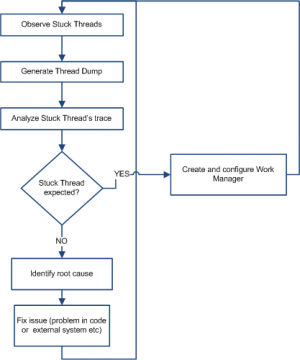Last Wednesday September 28, the Oracle Fusion Cloud Application Foundation organized an interesting evening at the Oracle Netherlands headquarter in Utrecht. The main purpose was to get development and managed service support together in one room to meet and try to solve challenges. Making the statement that Oracle Fusion is the central platform for middleware and that this is the place where applications come together. The organizers see the WebLogic product as the heart of every Oracle middleware implementation. And rightly so.
Dealing with stuck threads
The evening kicked off with the session “WebLogic Server Stability: analyze and avoid stuck threads” by Maarten Smeets, developer (AMIS) and Ankur Arora, member of the operation team (Qualogy). The aim of their presentation was to dive into the subject of stuck threads: how can you detect and tackle them? Stuck threads are a major cause of stability problems in WebLogic Server environments. Administrators and developers, who are affected, often do not know what to do with it. According to the speakers, it’s of critical importance to make sure that when you are having an issue, your implementation is not failing. Basically like a boat that can’t sink, because it’s designed with compartments that can be isolated.
Within the first few minutes, the speakers convinced me of the fruitfulness and efficiency of a good cooperation between developers and operation teams.
Creating this “DevOps environment” enables you to quickly troubleshoot your issue and take action to fix the specific service or server. Following a strong stuck threads analysis process like the one depicted in the image below, will help you in the right direction, making your implementation more stable and “waterproof”.
Keeping the process running
A technical demo showed us several methods and best practices for creating a stuck threads dump, using tools like TDA-Thread Dump Analyzer to analyze the errors more efficiently. This was very useful for me since my team was asked to help by analyzing stuck threads on a regular basis at Liberty Global. Hence, I got the chance to share and bring into practice some of the notions I learned about how to work around the problem. For example: after identifying the code that causes the stuck thread, you can use Work Manager to execute your code and keep the process running.
Managing the infrastructure
Edwin van der Veen and Nicolay Moot (Transfer Solutions), both from Managed Service team, provided us with a second engaging presentation called “Managing Oracle Fusion Middleware Infrastructure”. Their presentation approached the Integration Layer from another perspective, namely that of Support: the people that are standing by 24/7 to resolve all sorts of customer issues. They need to keep the code delivered by developers running on production environments, and to release it
during a Go-Live. In this session Van der Veen and Moot spoke about a broad range of subjects the support team might encounter, such as high availability architecture, automation of process via scripting, software releasing, security and patching.
It was interesting to see that most of the showed solutions and approaches are identical to the ones we are already using at Liberty Global. Still, I got good input for improvements and extending currently delivered solutions with extra useful features. Most tasks, however, seem still to be done manually and are only partially automated. Currently we are working on a project called “One click provisioning” together with the operation team of Liberty Global and Oracle. Our aim is 1) to automate the provision of the infrastructure environments for our Oracle Fusion Framework; 2) to automatically deploy the framework application code release, ready for projects deliverables. Doing so, will save a lot of time and will add value to the business. We are forging all the knowledge we have – from Integration, BI, DevOps to Managed Service best practice – providing various innovative smart solutions to clients.
Stay tuned
The SOA/BPM Special Interest Group (SIG) announced a new event with two more sessions: “The use of IoT Cloud Service for building management: an example” and “API management – Journey & Approach”. I already signed up for it!
My colleague Manuel Xavier will give you the opportunity to dive deeper into API in his blog “Why invest in API Management?”. Keep checking our website for interesting upcoming blogs!
Other relevant DevOps content
- BLOG: Red Hat – OpenShift Day-2 Ops from the trenches
- REPORT: 2018 State of DevOps Report – DevOps Research Assessment
- OFFER: DORA – DevOps Research and Assessment
- BLOG: Observability in OpenShift with Prometheus
- WHITE PAPER: The Digital‐Native Enterprise – The Red Hat and Devoteam Success Formula
- BLOG: Shared continuous delivery toolchain, the silver bullet?
- NEWS: Atlassian Gold Solution Partnership for Devoteam
- INFO: Our CALMS approach towards DevOps
- CASE STUDY: Improving the CIO delivery cycle at Liberty Global
- BLOG: Monitoring to reduce Mean Time To Recovery (MTTR)
- EBOOK: API Strategy and Architecture
- EBOOK: DevOps Perspectives
- OFFER: DevOps and Culture
- OFFER: Continuous Delivery
- CASE STUDY: Same meat, different gravy
- BLOG: Become a high performing organization with DevOps as business enabler

